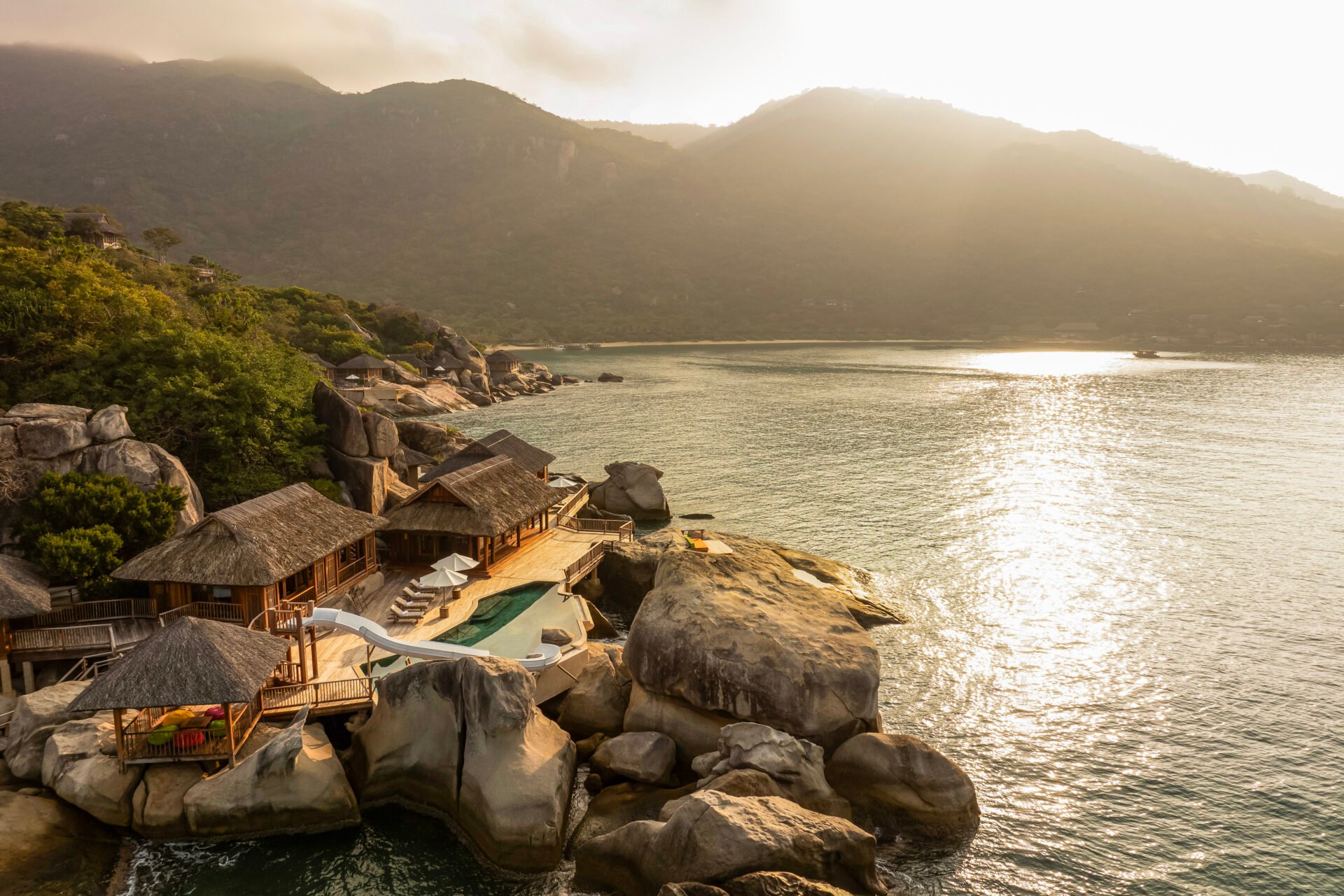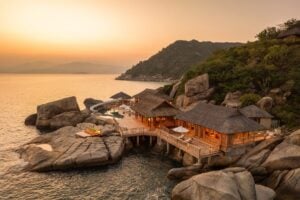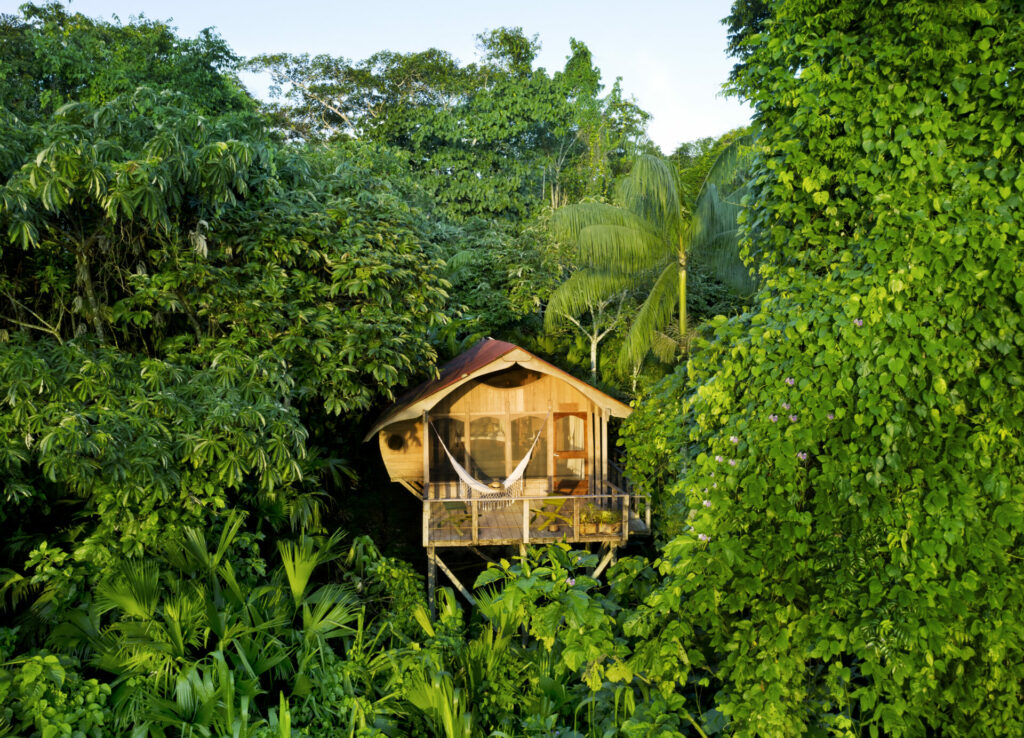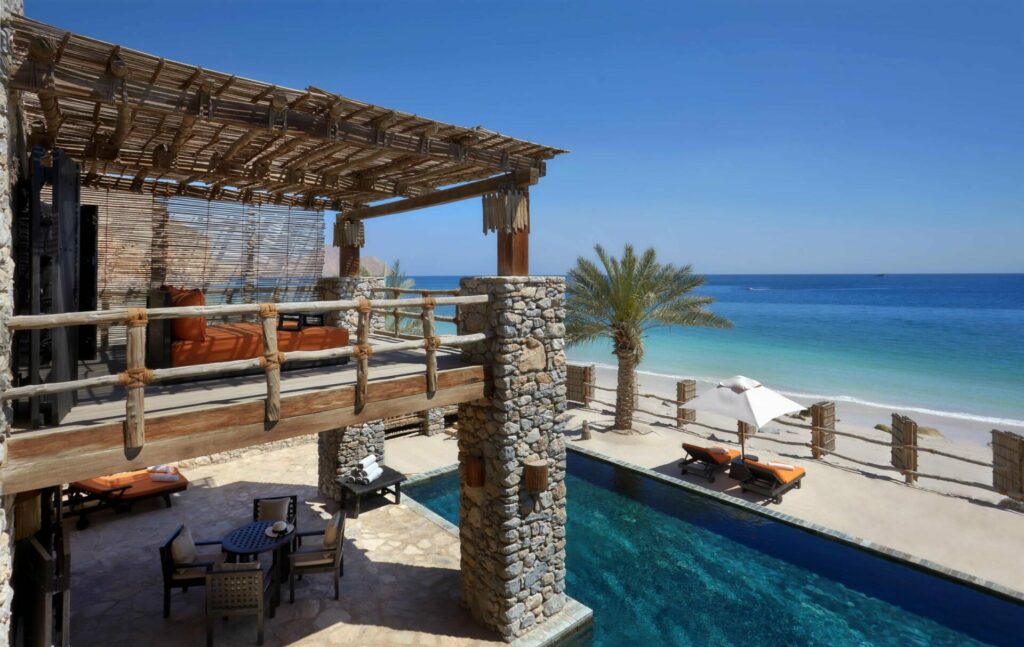I’m lying by my private pool with a coffee, listening to the waves rolling in at the bottom of the sandy path that leads from my thatched-roof villa at Six Senses Ninh Van Bay directly to the shore. I’m contemplating the day’s activities, when the forest that surrounds my villa suddenly comes to life. Branches crack and leaves fall to the floor, and I quickly realise it’s the unmistakeable sound of a monkey troop. But these are not just any monkeys, they are the critically endangered black-shanked douc langurs who call this Vietnamese island home.
Usually, these arboreal primates keep to the dense tropical forest that climbs up for miles behind the resort, but today, it seems they’ve ventured down to say hello. I watch as the family swings effortlessly from branch to branch, playing and eating the evergreen leaves before leaping from the treetops onto my thatched villa roof, moving next door, where a brook winds down from the mountains to meet the sea.
The babies are the cutest, their tiny faces sizing up the distance between treetop and rooftop, rocking for momentum before catapulting themselves forward onto the woven palm frond roof. I stand quietly watching, aware that witnessing these vulnerable creatures so close is a rare privilege. A privilege that defines what Six Senses does best: blissful luxury with purpose.
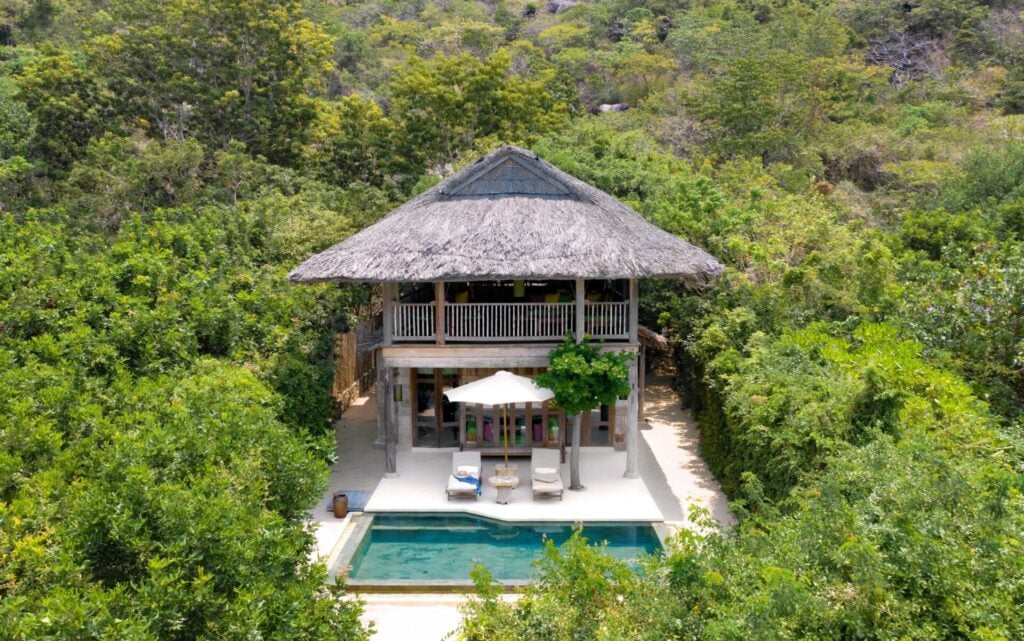
Spread across more than 40 hectares, Six Senses Ninh Van Bay feels more like a private island sanctuary than a resort. The 62 secluded villas are tucked into the curve of a private bay, fringed by jungle-clad mountains and lapped by the East Vietnam Sea. Their roofs rise like giant Vietnamese sun hats above private gardens and are shaded by banana palms, fig trees and coastal hardwoods, the same forest that shelters the langurs.
The baby langurs are the cutest, their tiny faces sizing up the distance between treetop and rooftop, rocking for momentum before catapulting themselves forward onto the woven palm frond roof
Guests get around on personalised bicycles pedalling along sandy trails shaded by palms and frangipani. It’s the perfect way to take in the resort, from its tucked-away spa and farm to hidden coves where, if you’re lucky, langurs swing between trees.
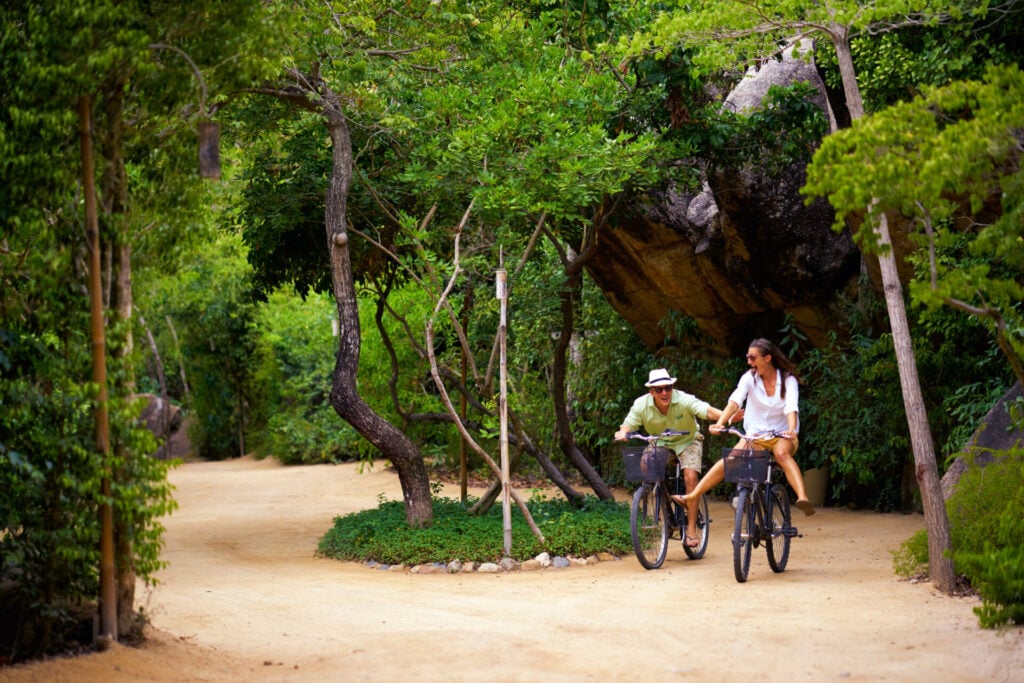
Sustainability Woven Deep
Sustainability is part of Six Senses’ DNA, and the award-winning Ninh Van Bay is no different. From coral restoration and solar-powered farms to waste-free kitchens, community initiatives and conservation efforts, everything has been designed to protect it’s fragile environment.
The property’s 800 solar panels generate nearly a fifth of its energy needs, while its organic farm supplies much of its fresh produce, around 1.2 tonnes of fruit and vegetables every month in fact. Spinach, papaya, mushrooms, lemongrass and pumpkins, amongst many others, thrive in the tropical heat, shaded by the solar panels that double as protection against the heavy monsoon rains, while also preventing nutrient-rich soil from being washed down into the sea.
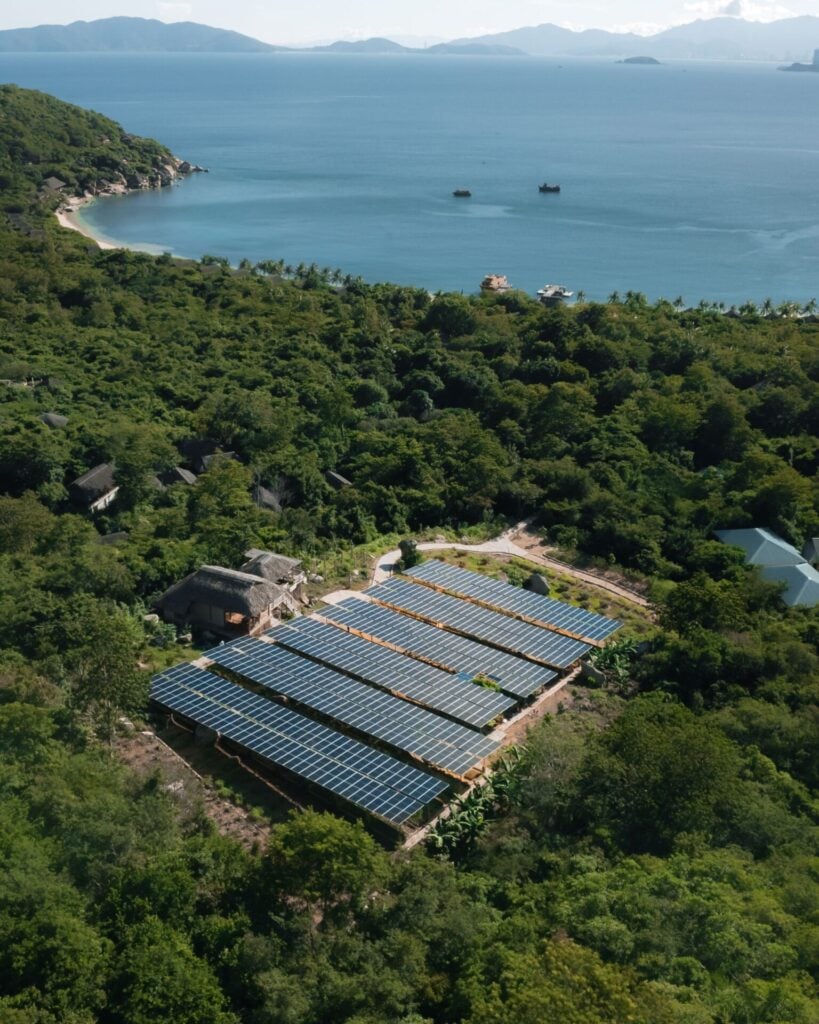
Guests are encouraged to learn about the nature and wildlife that shapes the island through the resort’s Earth Lab, a Six Senses hallmark found across all its properties. At Ninh Van Bay, the Earth Lab and its neighbouring Alchemy Bar work together to turn sustainability into something guests can see, feel, and take home.
Spinach, papaya, mushrooms, lemongrass and pumpkins, amongst many others, thrive in the tropical heat, shaded by 800 solar panels that double as protection against the heavy monsoon rains
Set high above the bay, the open-air space allows guests to try their hand at crafting natural products using locally sourced ingredients, from agarwood incense, believed to bring good fortune, to soap made from recycled cooking oil, and body scrubs infused with coconut, coffee grounds and orange peel essential oil. My own incense-making skills leave much to be desired with the cones I shape looking more like mini termite mounds than anything you’d find in a boutique.
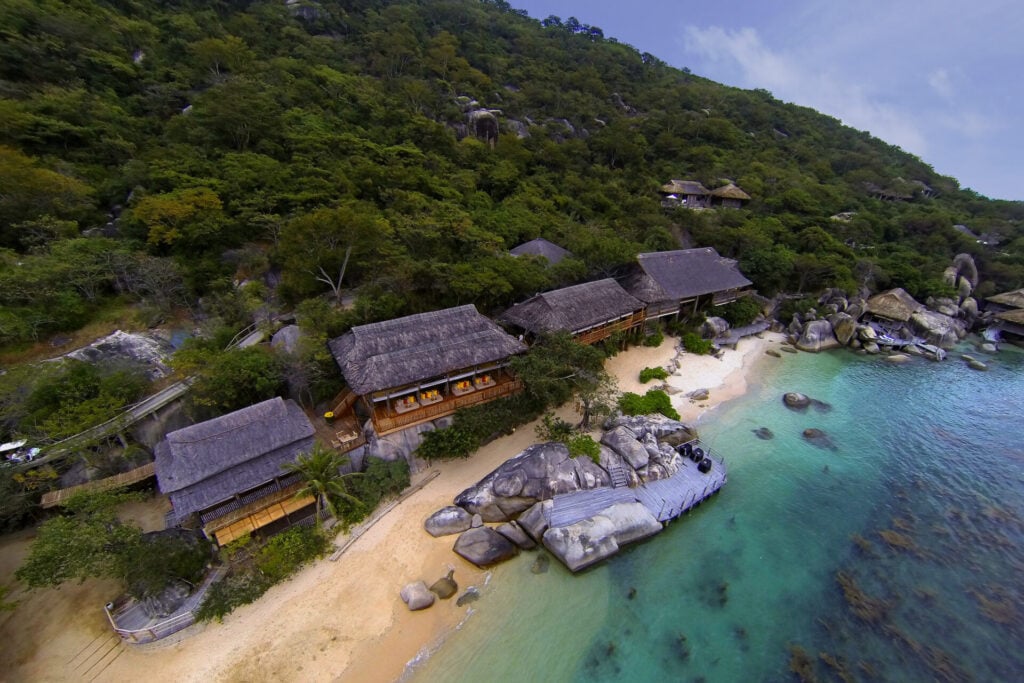
Luckily, my talents are far better suited to eating than incense making, and with three restaurants and two bars all offering panoramic views, there’s no shortage of choice for plant-based diners like myself. Between 40 and 50 per cent of its à la carte menus are vegetarian or vegan, created with ingredients grown on-site or sourced from nearby farms.
Over the two days of my visit, I’m spoiled for choice and try everything from the fragrant fresh rice paper rolls with herbs and vegetables, a Vietnamese seaweed salad with a red onion and cilantro dressing, to spicy lemongrass tofu with chili and spring onion.
At breakfast the traditional pho station – a popular Vietnamese noodle soup dish of a broth, rice noodles, herbs and vegetables – is not to be missed. Among the usual egg stations, there’s also a dedicated fruit and salad room, and a juice bar where you can create your own detox concoctions or brave the fiery fermented gut shot that includes an unlikely mix of turmeric, onion and apple cider vinegar. Not for the faint hearted!
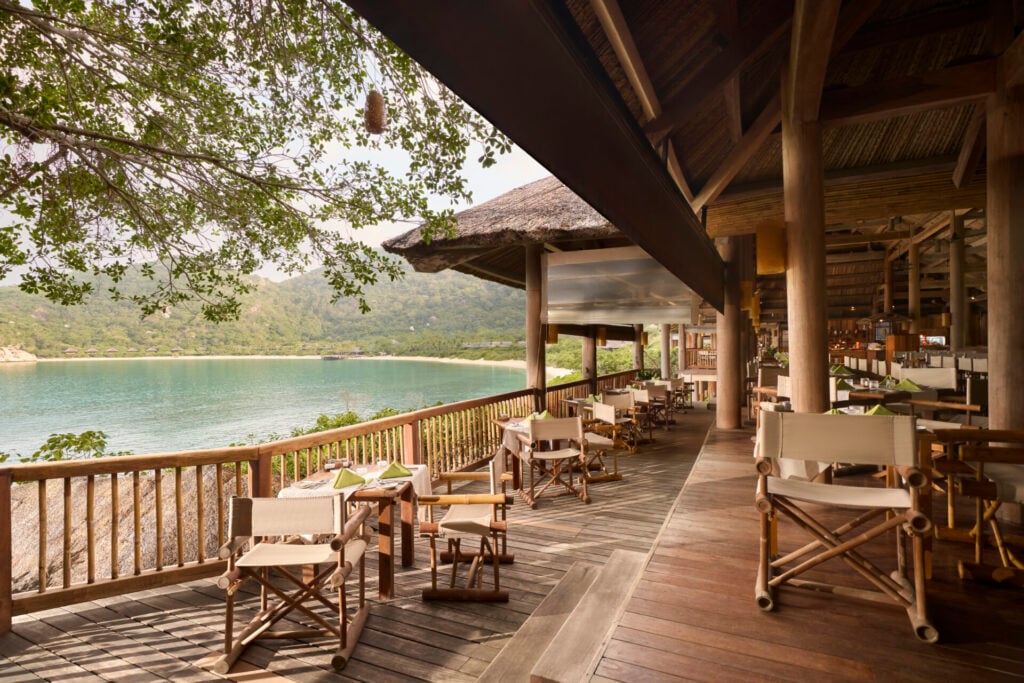
If fortune is on your side, as it was mine on day two, then breakfast here can come with a special view. One morning, a family of langurs appeared in the treetops beside the restaurant, watching diners between mouthfuls of leaves. While the sea is on one side and the rainforest is on the other, I chose a forest facing seat to enjoy breakfast in their company.
Guardians of the Reef and Forest
Here, the resort plays a vital role in protecting the rainforest and the creatures that call it home. The black-shanked langurs, found only in the south of Vietnam and parts of Cambodia, are critically endangered, their population pushed to the brink by habitat loss.
According to the World Bank, although more than two-thirds of Vietnam’s natural forests are in poor or regenerating condition, only about 5 per cent remain as rich, closed-canopy forest. It’s these last pockets that Six Senses focuses on safeguarding, using regenerative tourism to help restore biodiversity and strengthen the ecosystem rather than simply preserving it.
Recent camera-traps have revealed the return of species once thought lost, including the silver-backed chevrotain, alongside the Sunda pangolin and pygmy slow loris
Alongside local conservationists, the Ninh Van Bay team removes illegal snares – more than forty last year – helping to give the region’s wildlife a chance to recover. That commitment earned Six Senses Ninh Van Bay the Climate & Biodiversity Action Award at the 2024 HICAP Sustainable Hotel Awards.
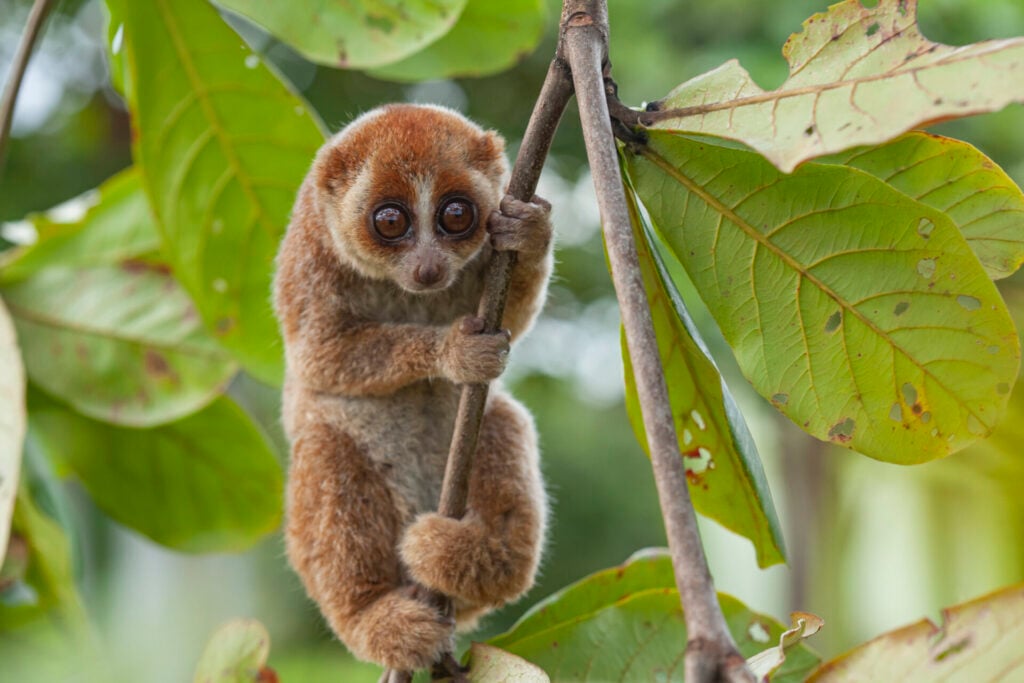
Recent camera-traps have revealed the return of species once thought lost, including the silver-backed chevrotain – a species thought to be extinct – alongside the Sunda pangolin and pygmy slow loris. Alongside NGO GreenViet, the resort has also helped increase the local langur population from 109 to 194 individuals since 2019.
For guests, the best way to explore is on a guided hike with GreenViet. It’s a chance to spot the langurs in their natural habitat, following winding trails that open up to breathtaking views of the bay and the mountains beyond. The path climbs through thick jungle alive with birdsong, where trees with medicinal properties and orchids cling to mossy trunks, before emerging at a vast freshwater lake.
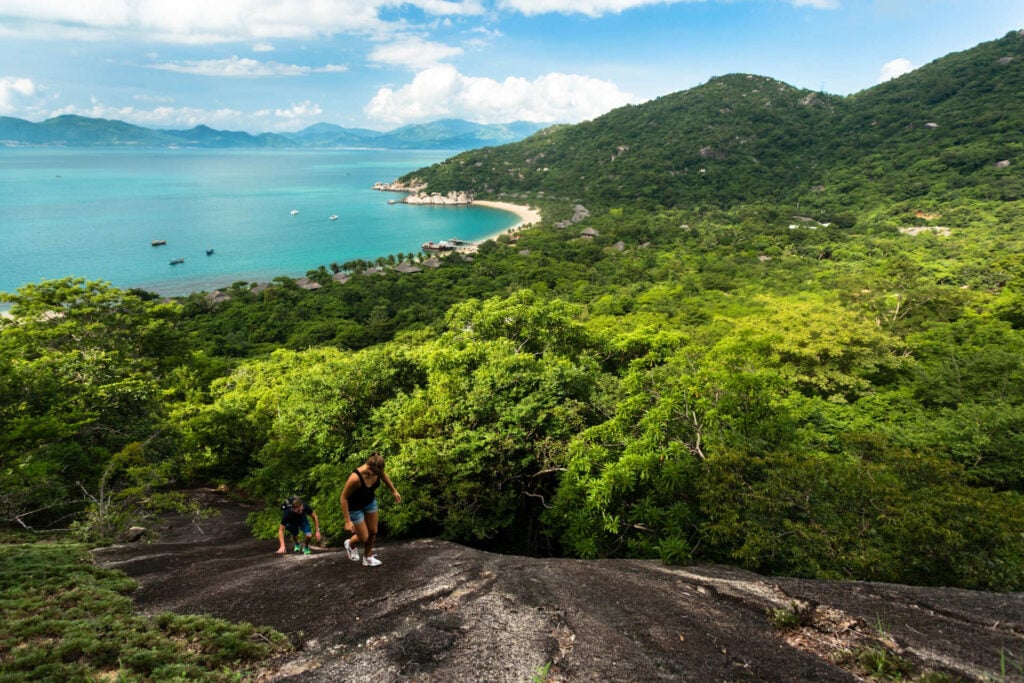
The lake is filled by rainfall and thanks to heavy monsoons in the area, and careful water management this year, it’ the fullest it’s been in a while. The resort filters and reuses this water through a reverse-osmosis system, reducing strain on the natural aquifers and helping to keep the surrounding ecosystem in balance.
As we walk back down taking in the breathtaking views, we learn that conservation isn’t confined to the land. Guests can also get involved in marine restoration projects via the Experience Centre, where marine biologists offer coral-planting sessions.
I still saw electric-blue starfish, butterflyfish and damselfish near colourful corals of all shapes and sizes. A couple of spiky sea urchins lurked nearby, and having been warned about them, I quickly retreated in the opposite direction
After recent typhoons, many fragments of coral were naturally broken away due to strong currents. Here the resident marine biologist gathered as many as possible so that guests can fix them to nursery frames near the shoreline, thereby creating new habitats for marine life. There are now 75 coral frames thriving under the waves mere metres from the shore. Despite widespread bleaching last year, some of the coral is thriving, bringing back bursts of colour to the seabed.
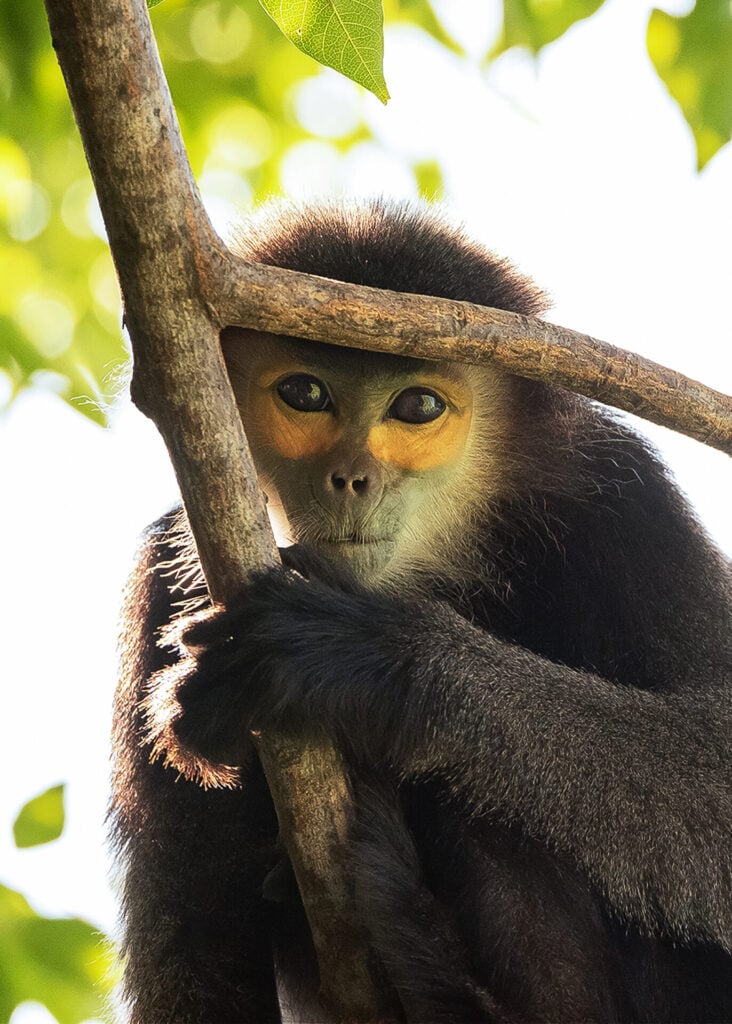
During a morning spent snorkelling out to the nursery, I was testament to this success. While visibility was poor due to the recent bad weather, I still saw electric-blue starfish, butterflyfish and damselfish near colourful corals of all shapes and sizes. A couple of spiky sea urchins lurked nearby, and having been warned about them, I quickly retreated in the opposite direction.
Sustainability continues inside the resort too. In true Six Senses style, there’s not a piece of plastic to be found, while bamboo – as a natural resource in this part of the world – is everywhere: dining outlets, bars, chairs, mosquito net frames, pool tables (in the shape of a boat no less), the movie night screen frame, and even the soft-glowing lamps that line the sandy forest pathways. It’s a hallmark of Six Senses globally to protect their environments by only using materials that are local and plentiful in each destination, and here it’s at every touch point.
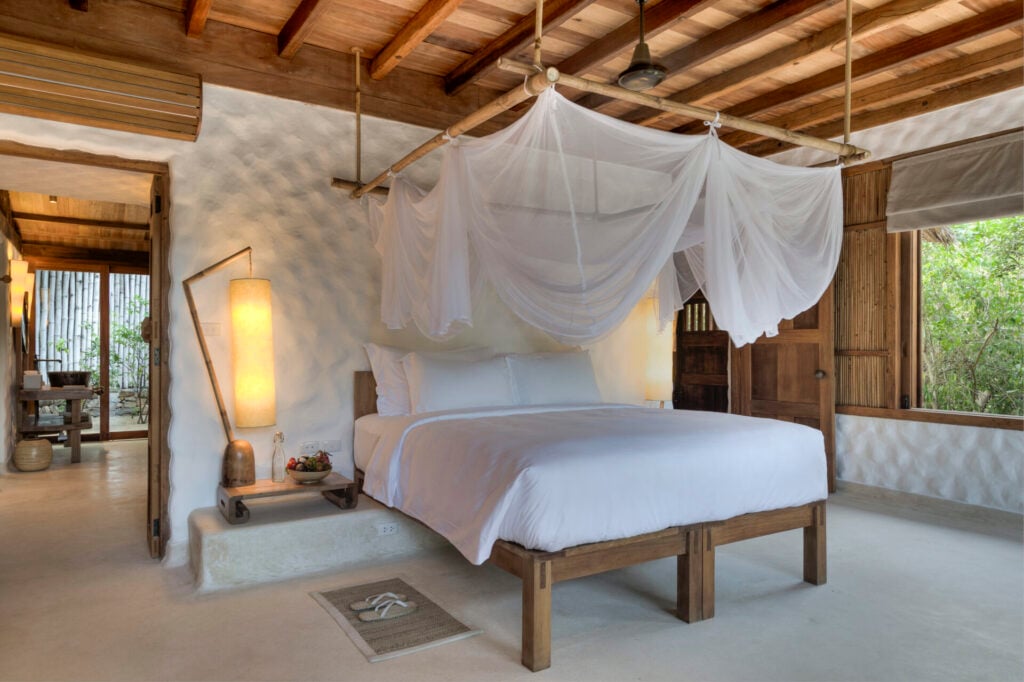
Community and Connection
Six Senses Ninh Van Bay’s sustainability ethos extends well beyond the resort, donating half a percent of its revenue to community projects across the Nha Trang region. They help fund clean-water systems, solar installations and environmental education programmes.
More than 80 per cent of its 385 staff are recruited locally, and many live in the on-site host village, where they take part in upcycling and repair projects, from repurposing bamboo hangers into children’s versions to creating natural mosquito repellents and lemongrass essential oils for the spa.
Across the resort, every detail has been designed with local craftsmanship in mind. The hand-woven textiles, pottery and bamboo structures are not imported but made by Vietnamese artisans. This commitment to working with the local community gives the property genuine authenticity.
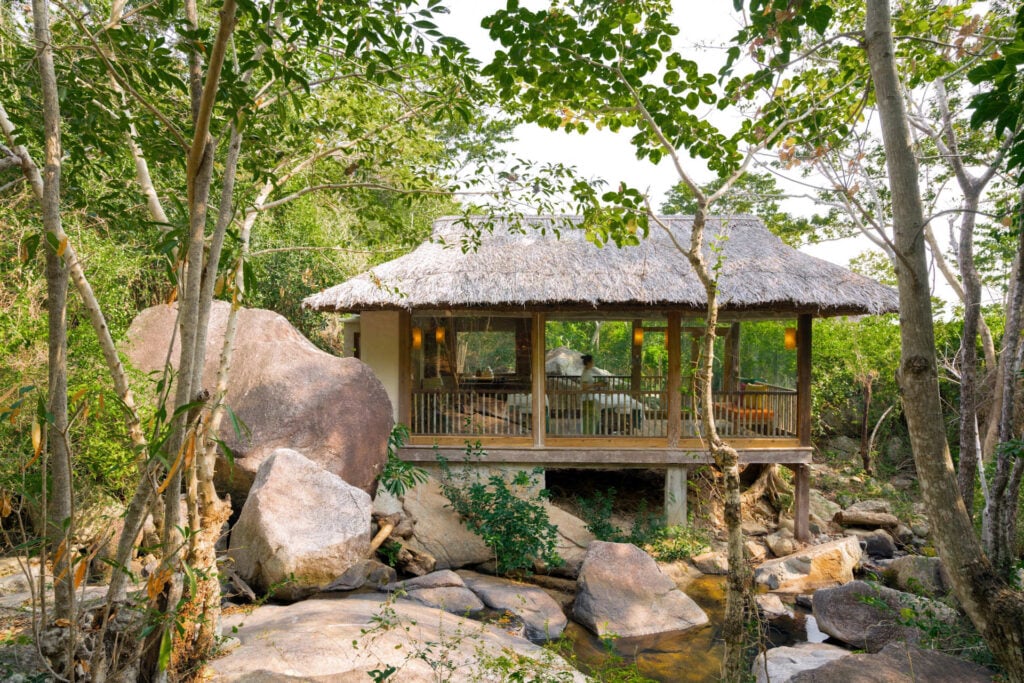
A stay at Six Senses Ninh Van Bay will leave you feeling connected to nature and community. Here the fresh food on your plate, the trees that shade your villa, and even the wonky incense you take home, all form part of an ecosystem that makes sense for people and planet.
And as the waves lap against the shore and night settles over the mountains in the distance, it’s impossible not to feel that the true luxury of Six Senses Ninh Van Bay isn’t only in its villas and views, but the Six Senses vision that the wild and human world can thrive side by side.
Details
Six Senses Ninh Van Bay is accessible via a one-hour drive and a 20-minute boat ride from Cam Ranh International Airport.
A beach pool villa at Six Senses Ninh Van Bay starts from Ð4,000 per night.
For reservations visit sixsenses.com

